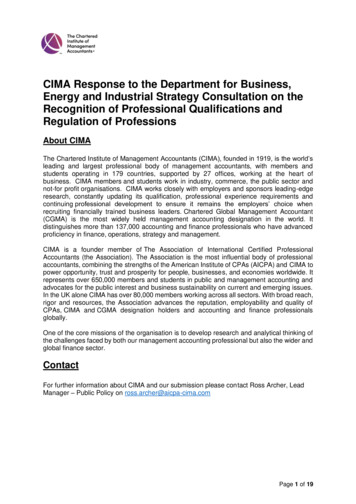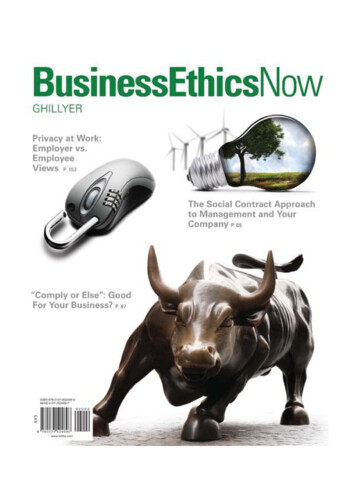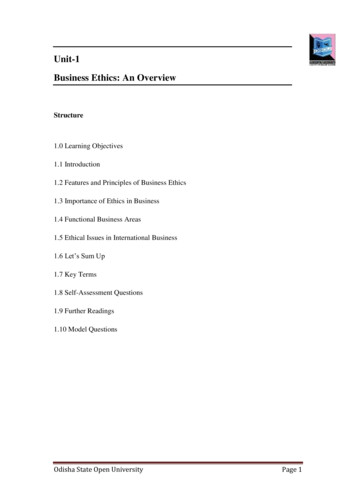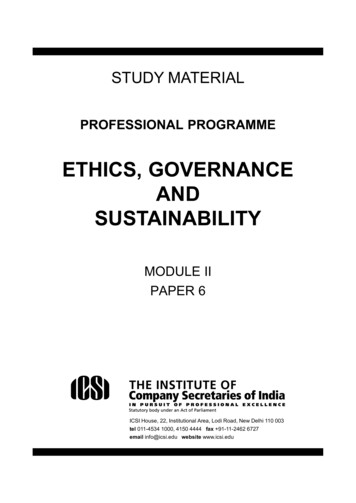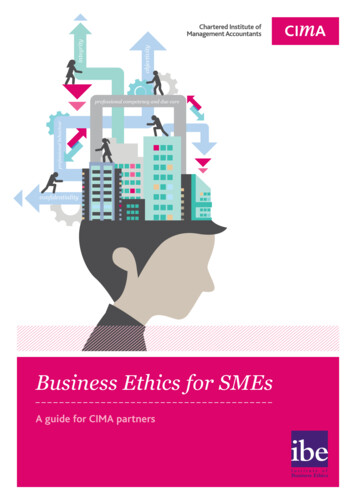
Transcription
objectivityintegritywww.cimaglobal.comChartered Institute ofManagement AccountantsChartered Institute ofManagement Accountantsprofessional behaviourprofessional competency and due care1confidentialityBusiness Ethics for SMEsA guide for CIMA partners
Business Ethics for SMEsWelcomeThis briefing, based on content initially published by theInstitute of Business Ethics, explores what business ethicsmeans for small to medium-sized business enterprises andhow they can introduce and support high standards ofbusiness practice. Professional management accountantshave specific obligations from their Code of Ethics to upholdethical principles and as such can make a direct contributionto the ethical conduct of businesses.Together with Embedding ethical values, this briefingsupports CIMA’s Training and Development Partners andQuality Partners to develop and implement a Code of Ethicsas per the foundation standards for the developmentof CIMA members and students.
www.cimaglobal.com1Why think about business ethics?Few owners and senior managers of small and medium-sized enterprises(SMEs) will deny the importance of good, trusting relationships with customers,employees, suppliers and the community. The success of their companydepends on it.Recent global focus on corporate misdeeds, such as garmentfactory disasters, environmental damage, banking scandals andhealth and safety issues in the food chain has increased publicscrutiny. There is now an expectation of ethical and transparentpractice from customers and civil society. Due to requirementshigher up supply chains, smaller firms are increasingly askedduring tendering processes with large corporations about theirsocial and environmental credentials and ethical riskmanagement.SME owners and managers will also recognise the importanceof trust and integrity in business after being on the ‘receivingend’ of unethical business practice; for example, when customersand suppliers deliberately do not meet agreed terms and conditionsand especially regarding late payments by customers.Owners and managers can often encounter ethical challenges.Examples include: D o I meet a deadline with my customer and ship out productseven though I know there is a possibility they might be faulty,or do I openly discuss my difficulties with the customer? H ow do I ensure that my employees do their work properlyand do the right thing? H ow do I deal with my employees’ desire to balance theirwork obligations with their personal ones? H ow do I respond when securing an important contractseems to require the payment of a kickback? D o I delay payment to suppliers and the Inland Revenue whenmy cash flow is currently limited?The desire to build trusting internal and external relationships,as well as growing pressures from wider society, should lead SMEowners and managers to consider the extent to which ethicalvalues and principles guide their business decisions (see Figure 1).What does ‘doing the right thing’ mean for the organisation?
Business Ethics for SMEsEthical Values in SMEsSMEs are characterised by informal understandings and shared expectationsamong the workforce regarding how business is done. Any values andethical principles will often be implicit rather than formally expressedthrough ethics policies, codes and programmes that are familiar inlarge companies.The culture and working practices of a small organisation aretypically influenced by the owner, manager or managing director.Through their very visible presence, their personal attitudes andbehaviours will set the tone of the business and have the potentialto signal to employees how seriously ethical behaviour is to betaken in the organisation.SMEs are not usually able to devote as many resources to buildingan ethical workplace culture as larger organisations. However,there are advantages to having a formal ethics policy in place.It reinforces and makes explicit the values and principles thatare part of the organisational culture, so allowing them to becommunicated to stakeholders. A code of ethics or similarguidance will provide support to employees on how they areexpected to conduct their business. Figure 1 sets out somebenefits of an explicit ethics policy.Importantly, a policy will provide a context and the vocabularyfor employees to raise any concerns they have with their supervisorsor the directors. This can be an early warning system that willreduce operational as well as integrity risks. It will form a frameworkfor management and staff to decide what is the ‘right thing to do’.CIMA members and students are bound by a professional Codeof Ethics — www.cimaglobal.com/ethics. This can directlybenefit the SME in which they work, as it requires them touphold fundamental principles, ensuring objectivity andintegrity throughout their working lives.Figure 1: Some benefits of making ethical values explicitIncreased employeeloyalty, highercommitment andmorale as well aslower staff turnoverAttraction of‘high-quality’ staffDecreased cost ofborrowing and insuranceReputational benefits(customers and suppliers)Generation of goodwillin the communities inwhich the businessoperatesfrom IBE: Developing a Code of Business Ethics guide, 2003More open andinnovative cultureSupports employeesto act ethically and raiseconcerns which reducesintegrity risks
www.cimaglobal.com2/3How to develop andimplement an ethics policy1. Identify and define core values of the businessAn effective ethics policy will be based on a set of values orprinciples. Values express beliefs about the ‘good’ and the ‘right’in the context of the organisation; they are commonly derivedfrom wider cultural and societal value systems. When identifyingthe organisation’s core values, it may help to think of some valuesas business values and others as ethical values, although thedistinction can be blurred and business and ethical values areoften interrelated. Some commonly found values are shownin Figure 2.In SMEs, these values will inevitably be influenced by the personaland professional values and principles of the owner and managers.However, it is considered good practice to consult employees aboutthis, asking them what they think the values of the organisationare. Employee involvement can increase the buy-in and effectivenessof an ethics policy; it is the first stage in embedding values inthe culture. Already being bound by a Code, CIMA members andstudents will join organisations already understanding the ‘valueof values’ and importance of professionalism, and they canprovide a positive support when embedding values in the SMEsin which they work.Figure 2:Business values may includeEthical values may includeCustomer liabilityRespectEfficiencyFairnessValue for moneyResponsibilityfrom IBE: Developing a Code of Business Ethics guide, 2003
Business Ethics for SMEs2. Draw up a code of ethicsA code of ethics is the main tool for implementing an ethics policy.Its purpose is two-fold: a) to provide practical guidance to staffand b) to make a public statement.It translates core values into specific commitments and expectedbehaviours in relation to the organisation’s key stakeholdergroups (i.e. customers, employees, suppliers and contractors,providers of finance and community). A code will also be a goodplace to address environmental responsibilities and to statehow the company seeks to relate to its competitors.When drawing up a code it is helpful to ask employees andother stakeholders about ethical issues that concern themand on which they would like guidance (see Figure 3).The code may be given an accessible title such as ‘The way wework’ or ‘Our values and principles’.A code of ethics cannot cover every situation but should makeclear the ‘spirit’ in which business should be done and pointemployees in the direction of further support.Figure 3: Examples of business ethics issues?!#@Bullying andharassmentUse of socialmediaPayingsupplierson timeHealth andsafetyConflicts ofinterestTaxavoidanceReligiouspractices inworkplacefrom IBE: Developing a code of Business Ethics guide, 20033. Embedding the codeThe code needs to be communicated throughout the company.All employees should be made aware of the code, the commitmentsthe organisation has made and the ethical behaviours that areexpected of them and how they can get support. It’s goodpractice for the owners and managers themselves to introducethe code to new employees and remind existing staff of theimportance of responsible behaviour on a regular basis, e.g. instaff meetings. Reminder communications could includeexamples of ‘right action’, consequences of ‘wrong actions’, andethical dilemmas.Appointing a designated ‘ethics champion’ should also be considered.This may be the board secretary or HR manager or, dependingon the size and set-up of the business, a non-executive directoror even a person outside the organisation. Such persons maydiscuss ethical issues and concerns with the directors and be acontact if an employee wishes to raise concerns or seek guidanceoutside the line management framework. The effectiveness ofthe ethics policy should be monitored through confidential staff,customer and supplier surveys which can assess if the company isliving up to its values.Employees should be encouraged to speak to their line managersor the directors if they are unsure about the ‘right’ responsein specific situations or if they have concerns over certaindecisions and behaviours.Owners or senior managers need to be aware that their behavioursets an example to their employees. For a policy to be effective,it is important that they are regarded as people of integrity,adhering to high ethical standards. The same applies for supervisorsand line managers, who should be reminded on a regular basisof this responsibility.
www.cimaglobal.com4/5External standardsand guidelinesExternal codes and standards, such as the CIMA Code of Ethics,will complement and strengthen the ethics policy and cultureof an SME. Recognition of informal and formal professionalcodes of practice may inform general business practice andgreatly enhance the business’s reputation.Some business sectors have launched initiatives that seek totarget specific ethical issues endemic in that industry – such asfighting corruption or creating fairer employment practices.Finally, there is an array of external ethics standards and guidelinesavailable to companies which can help identify their ethicalcommitments, and against which they can measure theirethical performance and make themselves accountable.Most of these are primarily designed for large corporations, butsome can be easily adjusted to fit the needs of smaller businessorganisations. An example is the GoodCorporation Standard, whichsets out a corporate responsibility framework using a stakeholderapproach, and Investing in Integrity which focuses on internalstandards and employees experience.Further reading and websites Webley, S. Developing a code of ethics, IBE, London, 2003. Business Ethics for SMEs, IBE Briefing No 6, London, 2007. Small Business JourneyCIMA is a subscriber to the IBE. For a copy of‘Developing a Code of Business Ethics’, by the IBE,please visit www.ibe.org.uk. Quote ‘CIMA’ and yourmembership number to obtain a subscriber pContains a section on ‘policy’ (business principles,purpose etc). Better Business Journey - Helping small and medium sizedbusinesses to increase their profitability and files/pdf/BITC%20SME final%20low%20res.pdfFocuses on social, environmental and communityresponsibilities. Anti-Corruption Portal for SMEswww.business-anti-corruption.com European Commission ‘Enterprise and Industry’: CorporateSocial Responsibility for SMEs tainablebusiness/files/csr/documents/ree report en.pdfIncludes: Awareness Raising Questionnaire ad/questionaire en.pdf GoodCorporation Standardhttp://www.goodcorporation.com/ Investing in Integritywww.investinginintegrity.org.uk Global Reporting /SME/ CIMA Code of Ethics and ethics resourceswww.cimaglobal.com/ethicsAlso see ‘Embedding ethical values: A guide for CIMA partners’.
Chartered Institute ofManagement Accountants26 Chapter StreetLondonSW1P 4NPUnited KingdomTel: 44 (0) 20 8849 SBN: 978-1-85971-802-5Institute of Business Ethics24 Greencoat PlaceLondonSW1P 1BETel: 44 (0) 20 7798 6040info@ibe.org.ukwww.ibe.org.ukCharity No: 1084014
BusIness ethICs for sMes 2. Draw up a code of ethics 3. Embedding the code A code of ethics is the main tool for implementing an ethics policy. Its purpo
